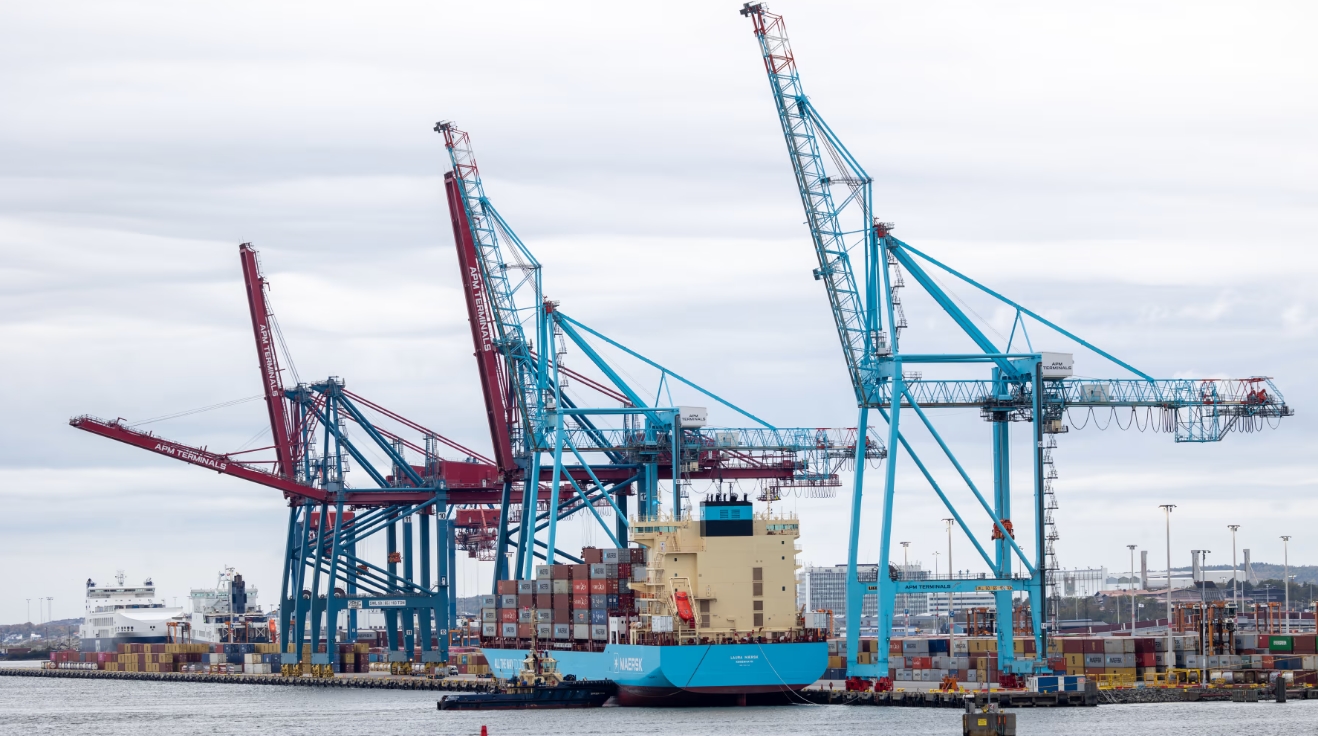On Tuesday, a truly unique ship arrived at the Port of Gothenburg for the first time. The container ship Laura Maersk is powered by biomethanol, resulting in a big step towards net zero greenhouse gas emissions.

"This ship is a significant milestone for the maritime industry's green transition, but it is just the beginning. We will see another nearly 200 methanol-powered ships sailing the oceans fairly soon," says Therese Jällbrink, Head of Renewable Energy at the Gothenburg Port Authority.
Laura Maersk, christened in Copenhagen on September 14, marks the start of the global shipping giant Maersk's major initiative to use renewable methanol as ship fuel. While Laura Maersk may be the first, the company has an additional 25 methanol ships on order for delivery between 2024 and 2027.
”A.P. Møller - Maersk has a goal to achieve net-zero greenhouse gas emissions by 2040, and we are pleased to collaborate with the Port of Gothenburg. Our partners are assisting us in reaching our ambitious green objectives and ensuring our customers a door-to-door service that helps them reduce their carbon footprint in their value chains. No one can tackle this task alone, and we need strong partners for the green transformation of shipping to succeed in time," says Birna Odefors, Nordic Managing Director at A.P. Møller - Maersk.
Maersk is not alone in making significant investments in renewable methanol propulsion. Several other shipping companies have vessels on order, with a total of around 200 either in production or undergoing conversion for methanol propulsion, approximately 125 of which are container ships.
Therese Jällbrink, Head of Renewable Energy at the Port of Gothenburg AB, welcomes Maersk's and other shipping companies' major investments, noting that they also exert necessary pressure on other stakeholders in the value chain.
"The production of renewable methanol must increase, and the cost gap between fossil and renewable fuels must decrease. Responsibility lies with everyone, from producers to policymakers, international maritime organizations, ports, and transport buyers. Everyone needs to step up, and we need to continue driving development together," says Therese Jällbrink.
Starting in 2024, shipping will be included in the EU's emissions trading system, leading to a reduced cost gap. In the coming couple of years, regulations from both the EU and the International Maritime Organization (IMO) will become stricter, with the IMO recently raising the goal from 50% to net-zero greenhouse gas emissions for shipping in 2050, while stepping down emissions incrementally according to the IMO's roadmap on the way.
The Port of Gothenburg is working to create conditions and incentives for this transition. Securing a supply of renewable fuels is a crucial part, and the port aims to become Scandinavia's largest hub for renewable energy. Renewable methanol is seen as a key component of the fuel mix.
The Port of Gothenburg was the first port in the world to establish necessary operational regulations for large-scale methanol bunkering last year, and conducted a world-first methanol bunkering operation from ship to ship. Today, one of the port's bunker suppliers is ready to supply methanol, and another is set to have everything in place by the end of 2023. The port also collaborates closely with production stakeholders to ensure a supply of renewable methanol at the port.
After unloading and loading at the Gothenburg port's container terminal, operated by APM Terminals, Laura Maersk will sail on to Bremerhaven on Wednesday. She will return to the port of Gothenburg again next week.
About Laura Maersk:
- Cargo Capacity: 2136 TEU (twenty-foot equivalent units)
- Length: 172 meters
- Width: 32.2 meters
- Draft: 11 meters
- Maximum Speed: 17.4 knots
The ship's name "Laura" is inherited from Maersk’s very first steamship in 1886. This ship was the first to carry the white seven-pointed star that would later become A.P. Moller – Maersk's logo. Like today's Laura Maersk, the ship had a significant impact on the maritime industry.
About biomethanol as ship fuel:
Biomethanol is a renewable fuel produced from biogenic, recycled carbon dioxide. From a well-to-wake perspective, it means that no new carbon dioxide is emitted during combustion. In total, carbon dioxide emissions can ideally be reduced by up to 95% compared to conventional ship fuels.